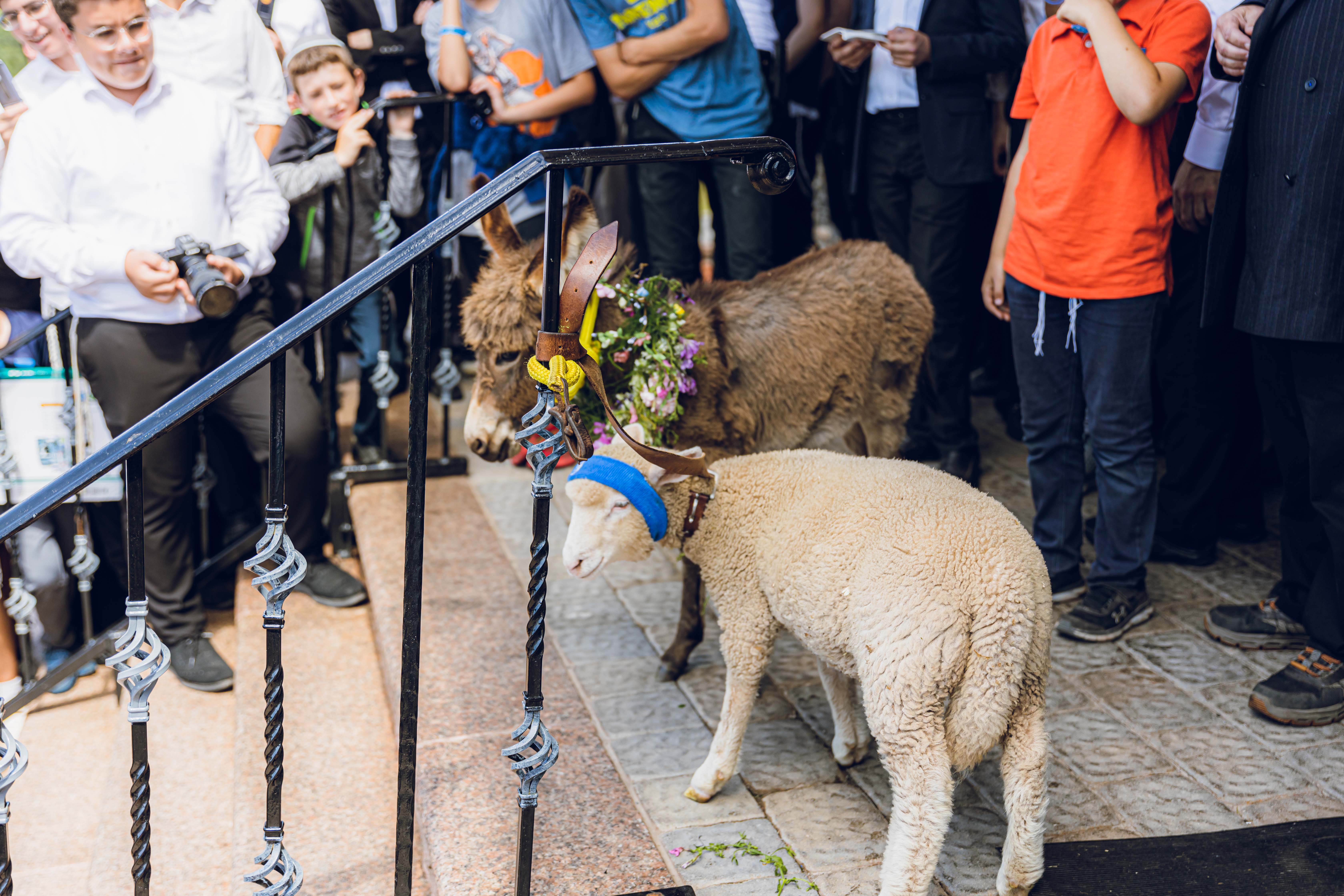Parenting: A Vital Skill
Parenting. Something every parent grapples with the moment a child is born. Life as we knew it is over. We can no longer come and go as we wish. Sleeping a full night now seems like a distant dream. One thing we know, however, is that we are responsible for these little bundles of joy, and they need us. We know we cannot afford to fail them.
To put this in perspective, there was a righteous and learned Jew who lived in Israel. His name was Rabbi Eliezer Brizel, of blessed memory, and he merited a long life, passing away at the ripe old age of ninety-seven. One of his grandchildren mentioned that at the time of his grandfather’s death, he had left over one thousand descendants – all observant Jews! We, as parents, possess this awesome power of raising the next generation of the Jewish people.
We recognize that parenting skills are necessary to raising healthy, wholesome children. We want to do better, to be better parents.
What is Jewish Parenting?
At first glance, one may wonder: what does parenting have to do with Judaism? Don’t all parents that are committed to their children’s success desire to acquire parenting skills?
The following analogy can shed light on this matter. Imagine a prince growing up in the king’s palace. He is royalty, but he is a child just like any other. He lacks for nothing, but if his parents want him to grow up to be a decent human being, they will need to invest in the parenting the child receives. Will the parenting of a commoner suffice for this child, a prince? Most definitely not. A prince is royalty, and royalty lives with different standards than the rest of society. The prince cannot behave the same way other children do, as a different conduct is expected of him.
We, too, are royalty, a nation of priests. The chosen people of Hashem (God). As it states in the verse (Shemot 19:6): “ואתם תהיו לי ממלכת כהנים וגוי קדוש, and you shall be to me a kingdom of priests and a holy nation.” The Jewish people are the treasure of Hashem, as it says in Shemot 19:5, “והייתם לי סגולה מכל העמים, and you shall be my treasure from all the nations.” We are the children of Hashem, as is written (Shemot 4:22), “בני בכורי ישראל , my son, my firstborn are you, (the nation of) Israel.“
We have been blessed with an abundance of secular books and workshops on parenting, which can guide us through many of the common challenges of parenting. However, despite the great value many of them can provide, these alone just won’t cut it. After all, we are royalty, and royalty abides by different standards. Greater things are expected of us.
Let’s Be Proud of Who We Are!
How can we instill these values in our home and into our children? Raising our children as Jews begins when we live our own lives with pride that we are Jews. This means that we are special, and we need to live our lives according to this principle. To hold our heads high, and truly believe that we are the chosen people of God, as we have seen from the verses mentioned earlier. We should impart to our children that our lives have a greater purpose.
What can we do to instill in our children to be proud of their Judaism? Rabbi Avigdor Miller, of blessed memory (a great Torah personality of the previous generation who influenced thousands with his lectures and writings on Jewish thought), would say that if we perform mitzvot (the commandments) with joy and pride, then our children will absorb that joy through osmosis, which they will carry on to their lives. Pride in something can only be achieved when we believe in it, and when we exude joy when we are engaged in it.
It is similar to family who are fans of a local sports team. When game night arrives, everything stops in the home. The entire family huddles around the screen to cheer on their team. They believe in the team, and they are proud of their team.
If we want to raise our children as Jews who are proud of their Judaism, we need to be proud of it ourselves. We need to constantly extol the virtues of our nation, our Torah, and our mitzvot. Let us talk about how much we love Shabbat, how we enjoy the yamim tovim (holidays), and how mitzvot are fun. Such an attitude will undoubtedly leave a deep impression on our children that will remain with them for the rest of their lives. They will hold their heads high and be proud of who they are. They are Jewish children, and we have the privilege and honor to pass on the torch of our heritage. We are the proud parents of Jewish children.
Jewish Parenting: Chinuch
The limited words of this article can barely touch the surface of the vast topic of parenting. Let us, however, attempt to illuminate the subject by beginning with one fundamental concept, which encapsulates the essence of what raising Jewish children is all about.
In the Jewish Orthodox community, the Hebrew word associated with parenting and teaching is “chinuch.” What does the word chinuch mean? This word is found in the verse in Mishlei (Proverbs- 22:6) “חנוך לנער על פי דרכו גם כי יזקין לא יסור ממנו, train the child according to his way, (so that) when he ages, he will not stray from it.“
In other words, Shlomo HaMelech (King Solomon), the author of Mishlei, is telling us that if we want our children to remain on the proper path, we need to teach them to do the right thing early on, so that the lessons remain with them when they grow old.
Chinuch: What Does It Mean?
Despite the literal English translation of the word “chinuch” being ”to train,” this is definitely not the intent of the word chinuch, as seen in other instances in the Torah. For example, when the construction of the Beit Hamikdash (the Holy Temple) was complete, there was a great celebration, which was referred to as “Chanukat Habayit” by King David (Psalms 30). The root of “chanukat” shares the same root as parenting: “chinuch.” Since one doesn’t train a home, a more appropriate translation of chinuch would be to “initiate.” Chinuch means the beginning of a new reality, such as a new home.1 So too, when we are raising our children, we are initiating them into the beginning of a new reality: life as a Jew in which Torah and mitzvot reign supreme.
To call parenting “training” could not be further from the truth. This can be illustrated by the study conducted by Dr. Ivan Pavlov (a well-known Russian neurologist and physiologist), which ultimately became known as Pavlovian conditioning. Dr. Pavlov trained a dog to salivate every time it would hear a bell ringing by associating the ringing of the bell with food. The dog salivated every time it heard the bell as it thought food was on the way.
We, too, can train our children, that whenever they behave, they get a treat. Whenever they misbehave, they receive a consequence. This is not chinuch, rather this is conditioning. The child is not doing the right thing because he wants to do the right thing, rather he is doing it because he likes candy or doesn’t like being sent to his room. When candies are no longer enticing, or when being sent to the bedroom is no longer scary, the child no longer has any motivation to do the right thing. If we want our children to remain on the right path when they grow old, this is definitely not the way to raise them. This is not chinuch.
So what is chinuch? Chinuch means to get the child to want to do the right thing, thereby initiating the child into a life of being connected to Torah and mitzvot, of growing in healthy and mature interpersonal relationships. If we want our children to join in our passion of say, enjoying a certain sport or a specific team, we make it exciting, rooting for the team, and by living and breathing the sport. So too, if we want our children to join us in our passion for Judaism, to be proud of their Jewish identity, we need to make Judaism exciting. That being said, it is important to note that while incentives and punishment do have their place in Jewish parenting, they cannot be the primary motivator for good behavior.
How to Motivate Our Children
At this point you may be thinking: “How can we motivate good behavior without resorting to punishment or incentives?” Our child just doesn’t want to go to bed, eat dinner, or share with his friends and siblings. How do we motivate them?
In a brief manner, we can share two points:
Number one, says Rabbi Shlomo Wolbe, of blessed memory (a prolific Torah educator and thinker of the previous generation), in his work Alei Shur (volume 1 page 259), parents need to be role models for their children. Children naturally emulate the things parents do, the way their parents speak, and the way they conduct themselves. It is for this reason that we need to be very careful to behave in front of our children in the manner with which we would want our children to follow. The way we carry ourselves is a major source of motivation for our children.
This can be used for the good and for the negative. The story is told of how a boy came to school on Friday. As is customary in many Jewish schools, young children get the opportunity to be the ‘Abba shel Shabbat,’ or ‘Shabbos Totty.’ The boy plays the role of the father at the Shabbat table. One week, the boy whose turn it was got up to the head of the table, clothed in his father’s oversized hat and jacket, gingerly stepped up, grabbed the Kiddush cup and let out a huge sigh, “Boy! What a hard week!” The teacher, shocked, asked the child, “Why did you say that?” The boy answered, “This is how my father begins the Shabbat meal every week!” The father of this child had taught his child that the Shabbat meal begins with a groan!
It is in our hands to set the tone in our home. What will our children feel when Shabbat begins? How will our children feel about going to shul (synagogue)? It is ultimately our choice if it will be with a groan and a tense uptight attitude, or if will it be with a smile and a relaxed atmosphere. It is all about our own attitude. Our actions speak louder than words. This will make all the difference in how our children will view Shabbat – and all of Torah and mitzvot for that matter.
The second important point is that motivation means to influence the will of the other person. After being motivated, the person has a desire to perform the act. We can motivate our children to desire to do the right thing, mainly through encouragement and positive reinforcement. This point is expounded upon greatly in the fundamental book ‘Spare the Child’ by veteran educator Rabbi Yechiel Yaakovson of Israel.
When our child does something right, we need to praise that action and encourage the child to continue in that path. Encouragement does not mean comparing one child to another, and it will not be productive to tell the child, “You can do it! All you are missing is the desire to do it!” These words will ring hollow on the child’s ears. He knows that we don’t really mean it.
Proper encouragement is contingent upon us truly believing in the abilities of our child. Point out how your child succeeded in the past and really mean it when you tell him that he can do it. Our children’s warm feelings resulting from our encouragement and positive reinforcement will cause them to be internally motivated to continue the good behavior. Although reward and punishment do play an important role, that does not transform the internal motivation of our children to want to behave.
Before we respond to our child’s behavior, we need to ask ourselves: will my reaction motivate my child to want to do the right thing in the future? If we are honest with ourselves, many times stopping to think of this question will inspire us to take a different response.
Although a single article cannot do justice to this immensely important topic, what we have discussed here can, with God’s help, serve as a springboard for us to become better parents. I highly recommend reading ‘Spare the Child’ from cover to cover.
In Summary: Raising Jewish Children
In closing, let’s summarize what we learned. We discussed that Jewish parenting means instilling in our children that we are royalty, and that makes us special. Secular parenting education is helpful, but we need more, as more is expected of us. We need to be excited about our Judaism, of Torah and mitzvot, to imbue the passion into our children. We explained the definition of Jewish parenting, “chinuch”, does not mean to “train our child,” as one would train a monkey, rather it means to initiate them into a life of Torah and mitzvot – to get them to want to embrace Judaism on their own. Some of the most effective ways to accomplish this is by motivating our children through personal example, encouragement, and positive reinforcement.
May God give us the strength to raise our children in the right path of Torah and mitzvot and give us the fortitude to be a role model for them. Amen.
By Rabbi Menachem Rosenberg
Rabbi Menachem Rosenberg is an alumnus of Yeshivat Kodshim in Eretz Yisrael and Beth Medrash Govoha of Lakewood. He is currently a member of the Kollel Aish Avraham semichah program and resides in Jackson, NJ.
[1] An ancient Jewish custom also known as a “Chanukat Habayit”, is in essence, a party to celebrate moving into a new home. This celebration is heralding the new beginning of a new home.


